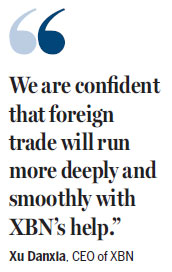Cross-border e-commerce district aids expansion of exports
|
A worker checks product samples to be exported overseas at XBN, a cross-border e-commerce platform in Beijing. Gao Jianjun / Xinhua |
Amid Beijing's determination to speed up the development of its service sector in order to spur diversified economic growth, XBN, a cross-border e-commerce platform, is one of the latest innovations in the city's rapidly expanding service industry.
Headquartered in Beijing, XBN has set up branches in the United States, Russia and Bahrain, offering foreign trade services for companies of all types.
After officially launching in just 2014, XBN is confident enough to say that it has covered all the major markets outside China.
The concept behind XBN's e-commerce platform is an integrated network of different e-commerce platforms such as Amazon, Ebay and Newegg, making a platform of platforms.
Through XBN, Chinese products enjoy easier access to any place in the world in a simple and direct way.
"E-commerce in foreign trade is very complicated. We need to compare all the existing modes together, including offline trade, to combine the different platforms to achieve more efficient importation," said Xu Danxia, CEO of XBN in a previous interview.
XBN functions as a platform of platforms for B2B and B2C businesses.
"Bearing an international vision and working with world-renowned e-commerce giants, XBN will upgrade the quality of Chinese foreign trade, gain more access for Chinese merchants and make their name heard," said Cheng Hong, vice-mayor of Beijing.
In the coming years, XBN will be passionately and ambitiously expanding the coverage of its e-commerce foreign trade.

The short-term goal for the next two to three years is to establish 82 more overseas operation centers, hopefully covering 137 countries and regions in total.
"We are confident that foreign trade will run more deeply and smoothly with XBN's help, and that we can provide a model of organizational ecology dynamics in cross-border e-commerce," said Xu, pointing out that the consolidation means less resources need to go into companies' sales departments.
"They can focus more on the products' development without worrying about where the products are going to sell." Xu was positive that XBN's headquarters in Central E-Commerce District of Daxing district will be a catalyst for the company's future development.
"We will benefit a lot from Daxing District after the international airport is built in the future," said Xu.
When asked why she placed the center in Daxing, Xu said: "The administration of CED has provided unreserved support in many areas including talent pools and flexible policies. It helped us a lot."
According to Xu, the CED has its own specialized e-commerce administration office and several investment companies in the area have a deep understanding of the industry.
They are thus able to provide flexible policies, adequate information and services to merchants in need.
"The CED is not only the witness of our company, but also the fuel for our development," said Xu.
In order to better serve the economy, Beijing has pushed forward a number of unconventional changes, such as experimenting with tax rebate policies for inbound tourists.
The purpose was to simulate consumption of commodities with lower prices.
So far in 2016, sales of duty-free commodities have surpassed 100 million yuan ($14.49 million).
renxiaojin@chinadaily.com.cn
(China Daily 11/29/2016 page15)













